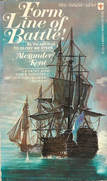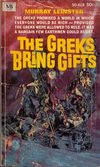|
The idea behind this weekly feature is to look back at something old and, to me, familiar, and to share it.
Familiarity breeds, far from its mis-assigned contempt, comfort. Not always, but often. The child who seeks a parent when confronted by a new situation is looking for the familiar to provide comfort, to provide a place from which they can dip their toe in the next adventure. That, at least in part, is the idea here on Throwback Thursday, to spread some comfort and/or provide a place to launch into new adventures. And, so, the books reviewed here on Thursdays are a variety and they are presented with enough detail (I hope) to allow that safe dip into the new or provide a smile of comfortable memory. This week, I am afraid, there has been not enough time in my life to prepare that space here properly and, thus, I leave you with just the thought that the familiar is a place to be sought, but only to find a safe place to move forward or to provide that comfortable, happy place of reflection and recollection. Hoping this finds all of you, gentle readers, in a great place.
0 Comments
For Poetry Duel 18 I hinted at the start that I was going to mix it up and that is what I did!
Duel 18 featured a Robert Frost poem on the left, "Spring Pools", and "When Spring Goes By" by Duncan Campbell Scott on the right. Mr. Frost needs no introduction; Mr. Scott was famous for a while at the end of the 19th century and first half of the 20th, and may still be in his native Canada, but I had never heard of him until recently. So, technically, Duel 18 had two "famous" poets. Frost won, rather convincingly, with an average rating of 4.0 to Mr. Scott's 3.0. Spring Pools These pools that, though in forests, still reflect The total sky almost without defect, And like the flowers beside them, chill and shiver, Will like the flowers beside them soon be gone, And yet not out by any brook or river, But up by roots to bring dark foliage on. The trees that have it in their pent-up buds To darken nature and be summer woods - Let them think twice before they use their powers To blot out and drink up and sweep away These flowery waters and these watery flowers From snow that melted only yesterday. When Spring Goes By The winds that on the uplands softly lie, Grow keener where the ice is lingering still Where the first robin on the sheltered hill Pipes blithely to the tune, "When Spring goes by!" Hear him again, "Spring! Spring!" He seems to cry, Haunting the fall of the flute-throated rill, That keeps a gentle, constant, silver thrill, While he is restless in his ecstasy. Ah! the soft budding of the virginal woods, Of the frail fruit trees by the vanishing lakes: There's the new moon where the clear sunset floods, A trace of dew upon the rose leaf sky; And hark! what rapture the glad robin wakes- "When Spring goes by; Spring! Spring! When Spring goes by." Annisette sat cross-legged on the grass peering through the stalks of the zinnias waving gently in the summer breeze. Her eyes were just below the level of the blossoms. She could hear the bees working busily but could not really see them until they slowly hovered from one flower to the next.
Her vision anyway was locked on her brother on the other side of the yard looking painstakingly through the rhododendron and lilacs. She could almost hear his whistling over the hum of the bees. She knew it was the theme to The Andy Griffith Show even though she never thought his whistling and the song sounded remotely similar. She waited until he made it to the pump house and the small white building blocked him from her view. She sprang up and dashed ten feet to suddenly sit again, this time behind the bed of snapdragons, the multi-colored flowers now waving at eye level. Jeremy emerged from the far side of the pump house and looked right at her without seeing. Her print dress blended perfectly with the flowers screening her from his view. His gaze passed to the zinnias and then even further to the sunflower bed. He started to amble in that direction. Annisette took her chance, jumping up and racing for the giant sycamore. Jeremy shouted “Ha!” and burst into a run on an intersecting path. She started to giggle as her bare feet pounded across the soft grass. She could hear him gaining ground, his much-longer legs eating up the distance between them, but, like often, his steps seemed to slow as they all closed together – Annisette, the sycamore, and Jeremy. She reached the tree. “Safe!” she squealed. And then he reached it, and her, and one finger tickled her ribs, expanding the giggle to peals of laughter. She collapsed to the ground out of his reach, still laughing, and a grin split his face. “You are so-o-o-o fast.” “And tricky!” she giggled. “And tricky” he agrees. “Next time I’m going to start looking at the zinnias!” “OK! Count!” and she starts to run into the middle of the yard, the giggling stopping with the seriousness of the next hiding place. Jeremy hides his face in the tree and starts counting, loudly, and peeking to see where she goes, “One! Two!...” In 1969 the ex-Royal Navy officer, Douglas Reeman, set his course to write a novel about a daring English captain during the Napoleonic Wars. Reeman chose to write the novel under the pseudonym Alexander Kent, a friend of his who had been killed in World War II. In Form Line of Battle, Richard Bolitho was launched.
Over the next 27 years there would be 26 more Bolitho novels, filling the entire period from the American Revolution to the final demise of Napoleon. Bolitho himself, like Horatio Hornblower who slightly preceded him and Jack Aubrey who is his contemporary in literature, has his basis in history with many real historical events being fictionalized into the books. The captains (earlier midshipmen and later admirals) are all an amalgam of the best in the Royal Navy during this tumultuous half century. I have read a lot of these seafaring naval novels and prefer the Bolitho ones if for no other reason than the entire panoply of the crew of a sailing man-o-war is captured with each of the characters having depth and a place to play in the plot. With all three I never did read the latter (in historical chronology) novels; after all the stories of personal command and risk I just could not adjust to the admiral worrying over strategy. The sailing is real - Reeman actually taught sailing and was intimately familiar with the needs to sail a large square-rigged vessel. The battle sequences are full and throaty. The situations are complex and the scenes painted thoroughly. From the back of the early paperback edition: "The year is 1793, and England is once again at war. For Richard Bolitho, the renewal of hostilities with France means a fresh command and the chance for action after months of inactivity." Form Line of Battle can be had for as little as $3.94 on Biblio. Recommended! Two older women walk into a pizza joint. They shuffle on unsteady legs to their table. When seated they nervously ask the waitress the price of each item, and their running total so far. Starting with a salad, two slices, and a soda each, they quickly delete items to get under $20. No salad, one slice each. "Is the bread free?" they ask hopefully. Painfully hopefully.
On one side of the two old women sits a young couple. One surmises they have escaped from a tiny child or two and are luxuriating in being adult and alone together, if only for a stolen hour. One the other side is a mature couple. One imagines their children successfully out of the nest and them trying to adapt to being alone together, now for the rest of their lives. The young couple gets the waitress' attention. Discretely they tell the waitress, give the women a second slice each, on us. She nods and scurries off, scribbling on her order pad. The mature couple on the other side flag down the waitress. Give the women that salad, on us, they say, unobtrusively. The women, as one item after the other is delivered splutter their disbelief. The waitress winks at the couples and each of them, in turn, assures the women that it's all right; they should enjoy it, if only just this once. And, as the waitress walks past the bar toward the kitchen the college kid grabbing a slice and a beer before heading to his night class slips her a ten. Your tip, he tells her, for taking care of the two women. Poetry Duel 17 was won by..."unknown" Jessica Para! Both poems got the same number of votes but Jessica's, on the left, got an average rating of 4.00 while the other poem, on the right, "The Good Man" by Gwendolyn Brooks, got an average rating of 3.67. Jessica has the amazing ability (on Twitter, where I first found her work) to pair a pictures with her poems. I have trouble enough finding one picture but she does it many times each day. Below is an example. The Good Man
The good man. He is still enhancer, renouncer. In the time of detachment, in the time of the vivid heather and affectionate evil, in the time of oral grave grave legalities of hate - all real walks our prime registered reproach and seal. Our successful moral. The good man. Watches our bogus roses, our rank wreath, our love's unreliable cement, the gray jubilees of our demondom. Coherent Counsel! Good man. Require of us our terribly excluded blue. Constrain, repair a ripped, revolted land. Put hand in hand land over. Reprove the abler droughts and manias of the day and a felicity entreat. Love. Complete your pledges, reinforce your aides, renew stance, testament. In 1982 Sue Grafton introduced private investigator Kinsey Milhone and the "alphabet" series was born. Grafton passed away in 2017 but she left us a gem of a series with these novels which finished using all of the letters but Z.
Grafton's father was a writer of detective fiction and Grafton's first attempts at novels were in that genre. However they did not enjoy commercial success and she turned to writing screenplays. Always fascinated with series whose titles were somehow related, like John D. McDonald's series of "color" novels, Grafton hit on the idea after reading Edward Gorey's Gashlycrumb Tinies. Each of the books is told from Milhone's perspective and is reminiscent of the "hard-boiled" detective novel of the 1950's. Grafton described Milhone as "the person I might have been had I not married young and had children". Milhone is tough and single, though clearly heterosexual and complex. The alphabet series is consistently rated at about 3.95 on Goodreads with some slight variation. A is for Alibi currently stands at a 3.82. The series is recommended for those who like their detective fiction told in first person and a little hard-boiled. From the back: "Laurence Fife was a slick divorce lawyer and slippery ladies' man. Until someone killed him. The jury believed that it was his pretty young wife, Nikki, so they sent her to prison for eight years. Now Nikki's out on parole and Kinsey Millhone's in for trouble. Nikki hires Kinsey to discover who really killed her husband. But the trail is eight years cold, and at the end is a chilling twist even Kinsey doesn't suspect--a second eight-year-old murder and a brand-new corpse." A is for Alibi is available on Biblio for as little as $3.94, including shipping. Another tie. Voting was light, probably because there was no guest poet - just me and Langston Hughes.
My poem, on the right, was "Precipice" from my Conditions collection. The poem on the left was Langston Hughes' "Dreams" which is one of my favorite short poems. Dreams Hold fast to dreams For if dreams die Life is a broken-winged bird That cannot fly. Hold fast to dreams For when dreams go Life is a barren field Frozen with snow. Precipice Standing on a precipice Don’t look down Forward or back, unhesitating Two choices Do or do not, no trying Microcosm Of life. Live, or be passed by Two choices On a precipice decide The Greks Bring Gifts was originally published in 1964 and reprinted in paperback in 1968 (the cover above). It is a classic science fiction tale of apparently benevolent aliens who turn out to be not so.
Murray Leinster (pseudonym of William F. Jenkins) was a prolific early science fiction writer with literally hundreds of stories, articles, radio plays, television scripts, and other works. He published his first story in 1916 and his last novel in 1969. He also wrote other genre fiction during the heyday of the pulps and would use variations of William Jenkins if a magazine already had one of his stories under the Leinster name! His stories include one of the first mentions of a universal translator ("First Contact" 1945) and one of the first descriptions of a computer ("A Logic Called Joe" 1946). He also won a Hugo award for his novelette "Exploration Team" in 1956. Greks is available on Biblio for as little as $3.97, including shipping. From the back of The Greks Bring Gifts: They came to Earth in their space ship, bearing fabulous gifts - such as machines that did any day job automatically, and fertilizer that made plants shoot up overnight. But they presented their gifts with contempt, and with a look in their eyes that made people feel "creepy". Still, because of the brave new world they promised, they Greks could be forgiven anything - until they left and people discovered the machines were breaking down. Then their only choice was to beg the Greks to come back, on their own terms. And they knew the terms would be hard... Poetry Duel 15 resulted in another tie vote but the "established" poet, Leonard R. Slade, on the left with "Artists", was a clear winner in the rating with 4.5. Mr. Slade is the author of over 20 books and collections. They are available wherever books are sold. Biblio has over 100 different copies starting at $3.97.
The "up-and-coming" poet was Lidy Wilks, with "Baby Rhapsody". Ms. Wilks' fine first collection, Can You Catch My Flow, was self-published in 2016 and is available in paperback and eBook on Amazon. Artists The world is looking for artists Of love in Myriad fields Of our humanity Namely, some musicians, as Loud as rolling thunder, Singing a song of hope. Somewhere, Beneath bruises and despair, A poet, unheard, melting Cold spirits, begging, "Oh let me soothe." A sculptor, hardening gray bodies Into breathing creatures And shaping permanent images Of forgotten humanists. At dawn I can hear music, ascending the heavens, feel Poetry, healing broken spirits, and see Sculptors, building a new world. Baby Rhapsody The news I had to tell that day, made him say what I knew he’d say. Head shaking, he said in dismay, “the bills to pay, the bills to pay.” Having a set will be such joy. A sister will be good for Troy. Ruining my trance, he says “Oi!, I’d like a boy, I’d like a boy.” Forty weeks of wishing have passed to use the name Kyna at last. But born on March 1st at halfpast a boy alas, a boy alas. Ty is too pretty to ignore. Still the name Kyna I adore. So unable to close that door, let’s try once more, let’s try once more. |
AuthorMe as a critic (be careful! the harshness will be well concealed!) Archives
April 2024
Categories
All
|









 RSS Feed
RSS Feed